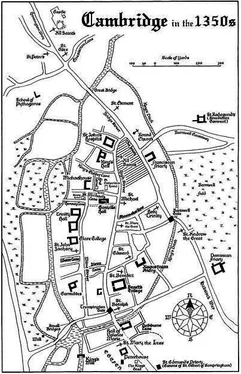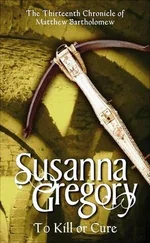‘I do not think so,’ said Michael hastily. ‘We do not want criminals and miscreants in the College, thank you very much!’
‘We do not,’ agreed Langelee firmly. ‘I am sure we can find some administrative duties to occupy your time, Father. There is always teaching. That will not require you to walk.’
‘It will,’ cried William, seeing that he was about to exchange duties he enjoyed, for ones he did not. ‘I cannot teach unless I pace. However, I am sure I can do something to help Michael.’
‘Yes, you can, actually,’ said Michael. ‘You can deal with the beadles’ claim for more pay that we have been avoiding all year. Thank you for your kind offer. I accept most gratefully.’
William’s face was a mask of unhappiness as he was carried from the conclave.
After William had been settled in his room with a jug of wine, Bartholomew retired to his own chamber to nap until Angel Mass. He slept well, despite his fears that he would not manage a wink, and wondered whether he owed that to the wine or to the fact that William’s leg had allowed his pre-sleep thoughts to concentrate on medicine.
Just before midnight he woke, when the sky was at its darkest. He hopped across the icy flagstones in his bare feet, aiming for the water Cynric left for him each day. The temperature had plummeted since he had retired, and the water had started to freeze so he was obliged to smash a crust of ice with the heel of his boot. He lit a candle, then began to shave, jumping from foot to foot in a futile attempt to stave off the painful, aching sensation in his legs that always accompanied standing on Michaelhouse’s stone floors in the winter.
Shaving completed, he donned shirt and hose, then tugged on a pair of shoes – new ones in the latest fashion that were fastened with an ankle strap and had stylish pointed toes. Over the shirt, he drew on a laced gipon – a garment with long sleeves and a padded body that was thigh length and very warm. His scholar’s tabard went over that.
Quietly, so as not to wake the scholars who were still sleeping, he headed across the courtyard to see William. The friar’s snores were loud enough to have made sleep impossible for the two students who had been instructed to stay with him that night. One was Quenhyth, who sat selfishly close to the lamp as he read some medical tract; the other, a Franciscan novice called Ulfrid, was rolling gambling bones on the windowsill to pass the time. Both looked up when Bartholomew arrived, and Quenhyth went through an elaborate pantomime designed to ensure that his master knew he had been working.
‘William will fine you if he catches you playing with those,’ said Bartholomew in a low voice, addressing Ulfrid and trying to ignore Quenhyth.
Ulfrid slipped the bones inside his scrip, although he did not appear to be disconcerted to be caught breaking the College’s rules about games of chance. He was a pleasant lad, with a scarred face resulting from some childhood pox.
‘Sorry,’ he whispered. ‘But I won these bones in a bet with a man in a tavern, and it is hard to resist playing with things that are new.’
Bartholomew struggled not to smile, thinking about the various Franciscan and University rules the student had just blithely admitted to breaking – frequenting taverns, gambling and enjoying possessions. ‘What kind of bet?’ he asked conversationally.
Ulfrid was dismissive. ‘The fellow had written an essay – he called it a book – about fish, and claimed that Galen’s cure for infected wounds was to allow a living crab to eat out the rotten parts. I told him that Galen recommended an oyster, not a crab, and that it was but one of many remedies for that particular condition.’
Bartholomew was impressed. ‘You are not a student of medicine, yet you know Galen?’
Ulfrid grinned. ‘Your description of cures for infections last week was so vivid and horrible that you claimed the attention of every student in the room, even though most were supposed to be listening to different lessons. You will not find a scholar in the College who does not know Galen’s solutions for festering wounds. It served me well, though: it won me a pair of dice.’
‘I am glad to hear it was of some use,’ said Bartholomew, not sure what he should deduce about his teaching skills from Ulfrid’s careless confidences. ‘The man who wrote this essay – was his name Harysone?’
Ulfrid nodded. ‘He is staying at the King’s Head while he persuades people to buy his book. However, if his knowledge of Galen is anything to go by, I think folk should save their money.’
Bartholomew was inclined to agree. ‘Why was he making bets?’
‘He wants to make lots of people aware of his book,’ said Ulfrid disapprovingly. ‘You know how it is: if people know about a thing they are more likely to buy it, regardless of whether it is good or bad. The same thing happened last year with gum mastic – it was said to remove the scent of wine from the breath and was an excellent glue. People’s obsession with it faded after a while, but not before enough had been sold to float the ark.’
‘So, Harysone is selling his wares,’ mused Bartholomew. ‘It seems he was telling Michael the truth. He said he was here to dispense copies of his work.’
‘He dances,’ said Ulfrid, more disapprovingly than ever. ‘In a way I have never seen before. I did not know whether to laugh or be offended. It reminded me of a Turkish whore I once saw in Bath. His display certainly seized everyone’s attention – which I imagine was what he intended.’
Bartholomew took his leave of Ulfrid, and wandered into the yard. There were three masses planned for Christmas Day, a pattern that would be repeated at churches, friaries and abbeys all over the country. At midnight there was Angel Mass, a pretty occasion, with candles filling the church with golden light, and the building rich with the scent of freshly cut branches. Bartholomew went to his room to don his ceremonial gown and hat, then waited in line with his colleagues until Langelee led the procession to St Michael’s.
Wynewyk went first, struggling under the weight of an immense cross that was part of the College’s treasury and that had been a gift from a wealthy benefactor. Bartholomew hoped he would not drop the thing – at least, not while the townsfolk were looking – and was grateful it only made an appearance on special occasions.
Behind Wynewyk walked Langelee, resplendent in his best robes. He cut a fine figure, his broad shoulders and barrel-shaped body made even more impressive by the addition of ample gold braiding and tassels. Bartholomew thought he looked like a wall hanging, and preferred the simpler style of the Fellows’ ceremonial gowns. These were ankle-length, and tied with a belt at the waist. They were made of scarlet worsted cloth, and the hem and neck were trimmed with fur – ermine for most, although Bartholomew’s was squirrel. The hats matched, and formed a ‘hood turban’ once they had been twisted around the head and the folds arranged properly.
The students followed the Fellows, also dressed in their finery, and bringing up the rear were the servants. Agatha the laundress was at the very end, doubtless believing that the best had been saved for last. She wore a sleeved surcoat that was designed to hold the contours of the body. In Agatha’s case this was unfortunate, given that those contours should have been reserved for her eyes only. She had persuaded the barber to arrange her hair in the latest fashion, which comprised vertical plaits running from the temples to the jaw and held in place by a net. It made her face appear even larger and more square, and Bartholomew saw several onlookers gape at the spectacle as she strode majestically past them.
‘Langelee has hired jugglers for the Twelve Days,’ said Clippesby to no one in particular as they walked. Talking while processing to mass was frowned upon, but without William’s disapproving presence, the scholars were more inclined to break the rules. ‘They are due to arrive tomorrow.’
Читать дальше












